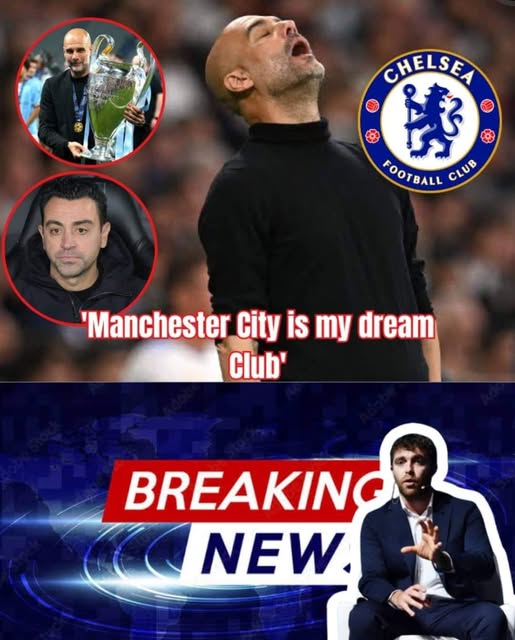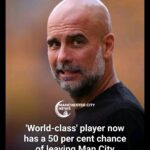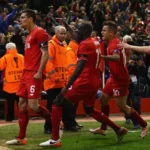Pep Guardiola and the Future of Manchester City: A Manager’s Journey Through Uncertainty

The world of football management is one fraught with uncertainty, pressure, and the constant specter of change. In January 2024, as the football community grappled with seismic shifts in managerial positions, Pep Guardiola found himself at the center of intense speculation about his future at Manchester City. His measured response to questions about his longevity at the Etihad Stadium offered both hope and caution to the millions of City supporters who have watched their club transform under his guidance.
The timing of these discussions was particularly poignant, coming in the wake of significant announcements from two of football’s most respected managers. Xavi Hernandez’s decision to step down from Barcelona at the end of the 2023-24 season had sent shockwaves through the Catalonian club, while Jurgen Klopp’s emotional revelation that he would be leaving Liverpool after nearly nine years painted a picture of managerial burnout that resonated throughout the football world.
The Weight of Success and the Burden of Excellence
Following Manchester City’s hard-fought 1-0 FA Cup victory over Tottenham Hotspur, Guardiola faced the inevitable questions about his own energy reserves and commitment to the club that has become synonymous with his tactical brilliance. The victory, while seemingly routine for a club of City’s caliber, represented another step in what has been an extraordinary journey of sustained excellence under the Spanish tactician’s stewardship.
When pressed about his future, Guardiola’s response was characteristically thoughtful yet guarded. With his contract set to expire in 2025, the 53-year-old manager acknowledged the possibility of extension while maintaining the careful balance between ambition and realism that has defined his approach to management. His hint at continuing “for at least another year and possibly longer” provided a glimmer of hope for City supporters who have become accustomed to a level of tactical sophistication and consistent success that seemed unimaginable before his arrival in 2016.
The context surrounding these discussions cannot be understated. Klopp’s announcement had cited “energy depletion” as a primary factor in his decision to step away from Liverpool, a revelation that struck at the heart of modern football management’s demands. The relentless pressure of competing at the highest level, the constant scrutiny, and the emotional investment required to maintain standards at elite clubs had clearly taken their toll on one of the game’s most charismatic figures.
The Evolution of a Tactical Revolutionary
Guardiola’s journey with Manchester City represents more than just a managerial tenure; it embodies the evolution of modern football philosophy and the pursuit of perfection in tactical execution. Since his arrival from Bayern Munich, the Catalan has fundamentally altered not only how City play football but how football is perceived and analyzed globally.
His extension of contract in November 2022 had already demonstrated his commitment to the project at the Etihad Stadium, but it also highlighted the unique relationship between manager and club that has developed over their years together. Unlike many modern managerial appointments that are characterized by short-term thinking and immediate results, Guardiola’s tenure has been built on long-term vision and systematic improvement.
The potential for a nine-year stay at Manchester City would indeed match Klopp’s eventual tenure at Liverpool, creating an interesting parallel between two managers who have defined Premier League football in the modern era. However, where Klopp’s Liverpool represented the epitome of high-intensity, emotionally-driven football, Guardiola’s City has embodied cerebral control and tactical mastery.
Historical Precedent and Unprecedented Achievement
The prospect of guiding Manchester City to a fourth consecutive Premier League title represents more than just another trophy for Guardiola’s already impressive collection. It would mark a feat never before achieved in English football’s top division, cementing his legacy as not just a great manager, but as someone who redefined what was possible in terms of sustained domestic dominance.
The fourteen major titles already secured during his tenure at City tell only part of the story. Each trophy represents countless hours of tactical preparation, player development, and the cultivation of a winning mentality that permeates every aspect of the club’s operation. From the Community Shield victories to the Premier League triumphs, from the FA Cup successes to the crowning achievement of the Champions League victory, Guardiola has systematically checked off every box that defines footballing greatness.
Yet perhaps more impressive than the trophies themselves is the manner in which they have been won. Guardiola’s City has not simply accumulated silverware; they have done so while playing football that has redefined beauty in the sport. The intricate passing patterns, the positional fluidity, and the tactical innovations have made City not just successful, but genuinely revolutionary in their approach to the game.
The Psychological Demands of Elite Management
The comparison with Klopp’s situation provides crucial insight into the psychological demands placed on elite managers in modern football. Both men arrived at their respective clubs with impressive pedigrees and clear philosophical approaches to the game. Both transformed their clubs into dominant forces capable of competing at the highest level. Yet the toll of maintaining such standards, season after season, cannot be underestimated.
Guardiola’s acknowledgment of energy levels and their potential impact on his managerial tenure demonstrates a level of self-awareness that is both admirable and concerning for City supporters. The intensity required to prepare teams for matches against opponents who are constantly evolving their approaches to counter City’s strengths demands not just tactical acumen but enormous mental resilience.
The Spanish manager’s meticulous nature is well-documented. His attention to detail extends far beyond match preparation to encompass every aspect of player development, tactical innovation, and strategic planning. This level of commitment, while producing extraordinary results, inevitably takes its toll on even the most dedicated professionals.
The Broader Context of Managerial Longevity
The modern football landscape has become increasingly hostile to long-term managerial appointments. The pressure for immediate results, combined with the financial stakes involved in contemporary football, has created an environment where patience is a rare commodity. In this context, Guardiola’s potential extended stay at Manchester City represents something of an anomaly.
The success of long-term managerial appointments like Sir Alex Ferguson’s legendary tenure at Manchester United or Arsène Wenger’s transformative years at Arsenal provides a blueprint for what can be achieved when clubs and managers commit to extended partnerships. However, the demands of modern football have made such appointments increasingly rare, making Guardiola’s situation all the more significant.
The stability provided by Guardiola’s presence extends far beyond the first team. His influence on youth development, training methodologies, and the club’s overall footballing philosophy has created a culture that will persist regardless of his eventual departure. This legacy aspect of his tenure adds another dimension to discussions about his future, as his influence on Manchester City will likely be felt for decades to come.
Technical Innovation and Tactical Evolution
One of the most fascinating aspects of Guardiola’s tenure at Manchester City has been his continued evolution as a tactical innovator. Rather than resting on the laurels of his successful systems, he has consistently adapted and refined his approach to stay ahead of opponents who have studied and attempted to counter his methods.
The introduction of the false nine position to Premier League football, the innovative use of inverted full-backs, and the sophisticated pressing systems that City employ all represent tactical innovations that have influenced football far beyond the confines of the Etihad Stadium. Opposition managers across Europe have attempted to replicate elements of Guardiola’s system, testament to its effectiveness and influence.
This constant evolution requires enormous intellectual energy and creative thinking. The process of staying ahead of tactical trends while maintaining the core principles that define his football philosophy demands a level of mental engagement that few managers can sustain over extended periods. Guardiola’s ability to continue innovating after years of success speaks to his exceptional commitment to tactical excellence.
The Human Element Behind the Success
Behind the tactical brilliance and trophy collection lies a human story of dedication, sacrifice, and the relentless pursuit of perfection. Guardiola’s intensity is legendary among players and coaching staff alike. His demands for excellence extend to every training session, every tactical meeting, and every moment of preparation.
This level of commitment has produced extraordinary results but has also required enormous personal sacrifice. The isolation that comes with the responsibility of managing one of the world’s elite clubs, the pressure of constant scrutiny, and the emotional investment required to maintain standards can take a significant toll on even the most resilient individuals.
The support system surrounding Guardiola at Manchester City, including his coaching staff, the club’s hierarchy, and the playing squad, has been crucial in enabling his success. The alignment between his vision and the club’s ambitions has created an environment where his methods can flourish, but maintaining this alignment requires constant effort and communication.
Strategic Implications for Manchester City
From a strategic perspective, securing Guardiola’s continued commitment represents far more than retaining a successful manager. His presence provides stability in an increasingly volatile footballing landscape, maintains the club’s competitive advantage, and preserves the institutional knowledge that has been built up over his tenure.
The alternative scenario of Guardiola’s departure would present Manchester City with one of the most challenging succession planning exercises in modern football. Finding a manager capable of maintaining the standards he has established while adapting to the evolving demands of elite football would represent a significant challenge for the club’s leadership.
The financial implications of managerial change at the elite level are substantial. The potential need to rebuild squads, implement new tactical systems, and manage the transition period could cost significantly more than the investment required to retain Guardiola’s services. From a purely business perspective, his retention represents excellent value for money.
The Competitive Landscape and Future Challenges
The Premier League’s competitive landscape continues to evolve, with clubs making significant investments in playing personnel and coaching staff. Arsenal’s resurgence under Mikel Arteta, Newcastle United’s ambitious project, and the continued strength of clubs like Liverpool and Chelsea ensure that Manchester City cannot afford to become complacent.
Guardiola’s ability to adapt to these changing circumstances while maintaining City’s competitive edge will be crucial to their continued success. His track record of tactical evolution and strategic adaptation provides confidence that he can meet these challenges, but the energy and commitment required to do so remain significant considerations.
The international football calendar’s expansion, with additional competitions and increased travel demands, adds another layer of complexity to elite management. Balancing the demands of domestic and European competition while managing player welfare and maintaining performance standards requires exceptional organizational skills and strategic thinking.
Legacy Considerations and Historical Impact
Regardless of when Guardiola eventually decides to move on from Manchester City, his legacy at the club is already secure. The transformation he has overseen extends far beyond trophy collection to encompass a fundamental shift in how the club operates and perceives itself.
The influence of his tactical innovations on football globally ensures that his impact will be felt long after his departure. Coaches and players who have worked under his guidance will carry his methods and philosophy to other clubs and countries, spreading his influence throughout the footballing world.
The standard of football that City have produced under his guidance has elevated expectations not just for the club but for the Premier League as a whole. Opposition teams have been forced to raise their standards to compete, resulting in an overall improvement in the quality of English football.
Conclusion: The Ongoing Narrative
As the 2023-24 season progressed beyond that January evening when these questions were first posed, the football world continued to watch closely for any indication of Guardiola’s long-term intentions. The pursuit of unprecedented achievements, including that elusive fourth consecutive Premier League title, provided immediate focus, but the broader questions about his future remained.
The call for behind-the-scenes efforts to secure Guardiola’s continued association with Manchester City reflected the understanding that his value to the club extends far beyond his current contract. The potential for future negotiations, the alignment of ambitions between manager and club, and the ongoing evolution of football all contribute to a complex decision-making process.
The prospect of Guardiola’s extended stay added anticipation to an already compelling football narrative. In the wake of Klopp’s announced departure from Liverpool, the stability that Guardiola’s commitment would provide took on additional significance. The managerial landscape of elite football seemed poised for significant change, making his decision all the more crucial.
As discussions about his future were expected to unfold after addressing immediate sporting objectives, one thing remained clear: Pep Guardiola’s influence on Manchester City, the Premier League, and football globally had already established him as one of the defining figures of his era. Whether that influence would continue from the Etihad Stadium touchline remained one of football’s most intriguing ongoing narratives.
The dedication to achieving success on the pitch that has characterized his entire tenure continued to drive his decision-making process. For Manchester City supporters and football enthusiasts worldwide, the hope remained that this dedication would translate into an extended commitment to the project that has already achieved so much and promised even greater heights in the future.
This analysis was written during a period of significant uncertainty in January 2024. The football world has since learned that Guardiola ultimately chose to commit his future to Manchester City through a two-year contract extension, demonstrating that the bond between manager and club proved stronger than the various pressures and uncertainties that seemed to threaten it.















